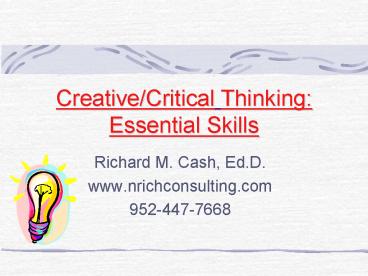Creative/Critical Thinking: Essential Skills
1 / 19
Title:
Creative/Critical Thinking: Essential Skills
Description:
The ability to solve problems or find ... In deciding how to spend your vacation, what factors would you consider? ... Analogy: How is an apple like a house? ... –
Number of Views:124
Avg rating:3.0/5.0
Title: Creative/Critical Thinking: Essential Skills
1
Creative/Critical Thinking Essential Skills
- Richard M. Cash, Ed.D.
- www.nrichconsulting.com
- 952-447-7668
2
Creativity The ability to solve problems or
find solutions by thinking outside the box.
There is no decisive definition of creativity,
but we know it when we see it. As our world
changes more rapidly each year, our children must
be provided with the skills to develop their own
creativity and creative thinking abilities.
3
What is Creative Thinking?
- Bringing into being something which did not exist
before. - Coming up with new ideas/ theories/ formulas.
- An essential survival skill for this fast paced
furious world.
4
FLUENCY The ability to generate many ideas.
This skill requires students to tell what they
know either through speaking, drawing, writing or
acting.
5
Putting Fluency to Work in Your Classroom
Brainstorming
- Generate as many ideas as possible.
- Work quickly.
- Add to other peoples ideas (piggybacking).
- Defer judgment until all ideas have been shared.
- List things that are.
6
Flexibility Generating a wide range of ideas.
Thinking of things in different ways helps
students build perspectives they may overlook
when trying to solve complex problems.
7
Putting Flexibility to Work in Your Classroom
- Organize your fluency list in some logical way.
- Use _____ is a different way.
- Create a metaphor Describe a person, place,
thing or event as a metaphor - (I.e. Bob is a loose cannon.).
- Seek out metaphors (Iron Curtain, computer virus,
VW beetle).
8
Originality Unique, unusual and not thought of
ideas. Development of this skill is an essential
component of higher-level learning.
9
Putting Originality to Work in Your Classroom
- What is the most unusual or novel occasion you
can think of for writing a note or letter to a
person? - List/Create new ways to use
- Add/Suggest/Combine____ to create new categories.
(Synthesis Evaluation)
10
Elaboration The process of providing extensive
and extended details. When a student is pushed
to color in all the spaces they will develop a
more holistic sense for solution building.
11
Putting Elaboration to Work in Your Classroom
- Discuss the many advantages of sending a note or
letter to someone you care about or havent seen
in a long time. - Add details to a simple picture/story (i.e. What
did the 3 pigs do the day before the story
began?). - Design a new classroom/school.
12
CRITICAL THINKING Reasonable, reflective
thinking that is focused on deciding what to
believe or do. The ability to think clearly and
reason logically is a primary goal of education.
13
Critical Thinking Strategies
- Compare contrast
- Sequence prioritizing
- Analyzing arguments
- Relevance Irrelevance
- Fact opinion
- Reliable unreliable sources
- Assumptions generalizations
- Cause effect
- Point of view
- Bias stereotype
- Deduction induction
14
All students must pass the Basic Skills Tests.
Positive Negative Intriguing
PMI
15
Consider All the Factors (CAF) When you have
to choose or make a decision or just think about
something, there are always many factors that you
have to consider. If you leave out some of these
factors, your choice may seem right at the time,
but will later turn out to be wrong. When you
are looking at other peoples thinking, you can
try and see what factors they have left out.
16
CAF at Work in Your Classroom
- What factors should you consider in designing a
chair - In deciding how to spend your vacation, what
factors would you consider? - A young couple is undecided whether to get
married at once or wait. What factors should
they be considering? - Do a CAF on the factors of choosing a career.
17
CoRT Thinking
- By
- Edward DeBono
- http//www.edwdebono.com/index.html
- The purpose of thinking is not only to deal with
problems but to make better use of what is
available. The purpose of design is to put
together known ingredients to create fresh value.
18
Seven Critical Questioning Strategies
- Analogy How is an apple like a house?
- Analysis of point of view What else would
account for the rise in crime? Who would benefit
from your point of view? - Incompletion How would you end this story?
- Web Analysis How extensive were the effects of
9/11? - Hypothetical thinking What if there were no
rain this summer? What if the schools ran out of
money? - Reversal What if Al Gore had become president?
- Application of different symbol systems Act out
this math problem.
19
Resources
- McLaughlin, M. Vogt, M. (2000). Creativity and
innovation in content area teaching.
Christopher-Gorgon Publisher, Inc. Norwood, MA.
800-934-8322 - Myers, R.E. (2001). Mind stretchers Creative
thinking extensions for the content areas.
Prufrock Press Inc.Waco, Tx. 800-240-0333 - Piirto, J. (1998). Understanding those who
create. Gifted Psychology Press, Inc. Dayton,
Ohio.































